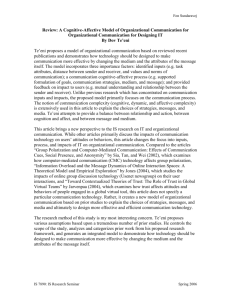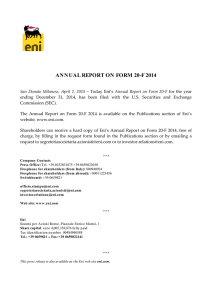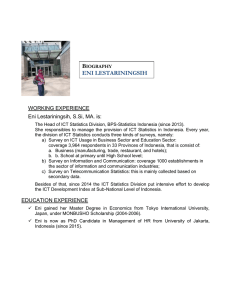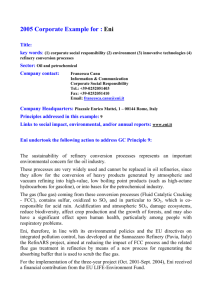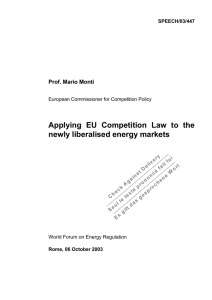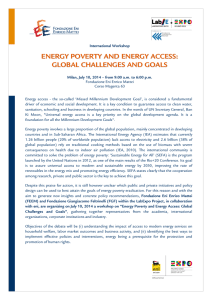Text of the Global Agreement between ICEM and Eni
advertisement
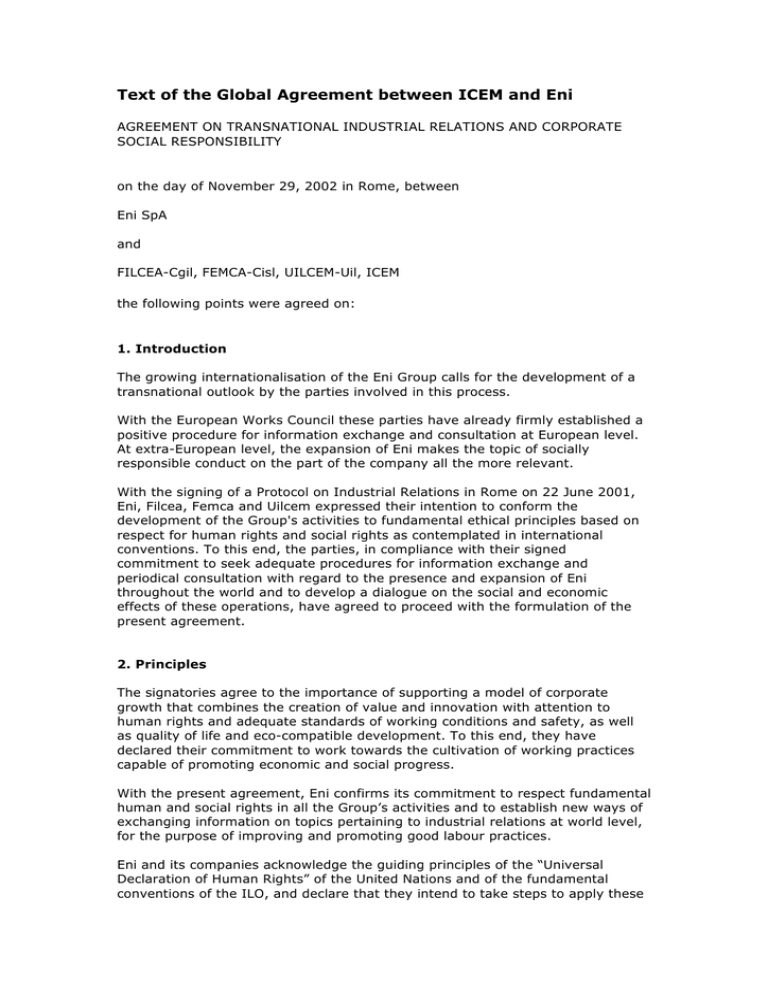
Text of the Global Agreement between ICEM and Eni AGREEMENT ON TRANSNATIONAL INDUSTRIAL RELATIONS AND CORPORATE SOCIAL RESPONSIBILITY on the day of November 29, 2002 in Rome, between Eni SpA and FILCEA-Cgil, FEMCA-Cisl, UILCEM-Uil, ICEM the following points were agreed on: 1. Introduction The growing internationalisation of the Eni Group calls for the development of a transnational outlook by the parties involved in this process. With the European Works Council these parties have already firmly established a positive procedure for information exchange and consultation at European level. At extra-European level, the expansion of Eni makes the topic of socially responsible conduct on the part of the company all the more relevant. With the signing of a Protocol on Industrial Relations in Rome on 22 June 2001, Eni, Filcea, Femca and Uilcem expressed their intention to conform the development of the Group's activities to fundamental ethical principles based on respect for human rights and social rights as contemplated in international conventions. To this end, the parties, in compliance with their signed commitment to seek adequate procedures for information exchange and periodical consultation with regard to the presence and expansion of Eni throughout the world and to develop a dialogue on the social and economic effects of these operations, have agreed to proceed with the formulation of the present agreement. 2. Principles The signatories agree to the importance of supporting a model of corporate growth that combines the creation of value and innovation with attention to human rights and adequate standards of working conditions and safety, as well as quality of life and eco-compatible development. To this end, they have declared their commitment to work towards the cultivation of working practices capable of promoting economic and social progress. With the present agreement, Eni confirms its commitment to respect fundamental human and social rights in all the Group’s activities and to establish new ways of exchanging information on topics pertaining to industrial relations at world level, for the purpose of improving and promoting good labour practices. Eni and its companies acknowledge the guiding principles of the “Universal Declaration of Human Rights” of the United Nations and of the fundamental conventions of the ILO, and declare that they intend to take steps to apply these principles within the context of their activities. In particular, they confirm: - the right of association and negotiation (ILO conventions nos. 87 and 98). All workers are entitled to belong to trade unions of their choice and to benefit from fundamental union rights; - prohibition of forced labour (ILO conventions nos. 29 and 105). Forced labour is prohibited; whether it be slavery or work performed by inmates; - prohibition of child labour (Conventions 138 and 182). Child labour is prohibited, especially in its most strenuous forms, and the right of children to complete their development and education must be safeguarded; - non-discrimination in employment (Conventions 100 and 111). Workers cannot be discriminated against on account of their race, sex, religious creed, political opinions or social origin. Men and women must receive equal salary treatment for work of equal value, and the principles of equal opportunity must be applied; - non-discrimination against labour representatives (Convention 135). Labour representatives are not to be subjected to any type of discrimination on account of their activities in representing workers; - continuing efforts to improve conditions of safety and health at the workplace, including the dissemination of the positive results already achieved within the Group. Eni reiterates its commitment to optimise and apply the Group’s principles: · Business ethics all Eni’s activities at home and abroad must be carried out honestly, with integrity and in compliance with existing laws. · Respect for stakeholders Eni respects all stakeholders (employees, shareholders, customers, suppliers, communities, business and financial partners, institutions, public organizations, industry associations, trade unions, and others) with whom it deals when carrying out its business activities, in the belief that they represent an important asset for the company. · Protection of workers and equal opportunities Eni observes universally accepted labor laws and complies with the “core labor standards” contemplated in the fundamental conventions of the ILO (International Labor Organization). Therefore the company guarantees freedom of trade union membership and the right to collective bargaining, while it repudiates all forms of forced labor, child labor and discrimination. Eni also assures equal employment and professional opportunities as well as equal treatment based on merit. · Enhancement of professional skills Eni acknowledges and promotes the development of individual employees’ skills and know-how as well as team work so that individuals can fully express their energy, creativity and potential. · Respect for diversity Eni draws inspiration for its business conduct from its respect for the cultures, religions, traditions and ethnic diversity of the communities where it operates and is committed to preserving biological, environmental, social, cultural and economic identities. · Respect for human rights Within its sphere of activities, Eni is everywhere committed to supporting the United Nations “Universal Declaration of Human Rights”. · Cooperation Eni actively contributes to the improvement of the quality of life and socioeconomic development of the communities where the Group is present. · Protection of health and safety Eni guarantees the highest standards of health and safety for its employees and the communities in all the areas of the world where it operates. · Environmental protection Eni will pay the utmost attention to the environment and ecosystem affected by its business activities and draws inspiration from the goals contained in international conventions signed by Italy on sustainable development. 3. Implementation procedures 3.1. Monitoring and initiatives To ensure application of the principles and conventions referred to above, Eni undertakes to carry out adequate monitoring activities by means of its own control instruments. In the course of the annual meeting, as indicated under point 3.5, appropriate procedures may be agreed on for the involvement of local trade unions or – where these do not exist – of representatives designated by the trade unions signing the present agreement. When information is received of situations that are out of line with or violate the agreement reached, the parties shall notify each other of the fact in timely fashion. Once the nature of the situation has been determined, Eni shall act to eliminate any anomalies, and inform the union organisations of the initiative. With regard to activities assigned to contractors, Eni shall formulate suitable guarantees against possible violations within the framework of existing contractual relations. 3.2. Affirmative action The parties may agree to carry out programs of affirmative action geared towards promoting fundamental human and social rights, together with good work practices; these programs may consist of activities involving information, training and research. 3.3. Information Eni and the signatory union organisations undertake to propagate the present agreement, by publicising its existence and contents. 3.4. Industrial relations Within the context of the principles referred to above, the parties acknowledge the importance of developing industrial relations at all levels that take into account the different socio-economic contexts in which the group operates. In light of the above, Eni and the companies of the Group undertake, within the scope of their responsibilities, to establish a constructive relationship with union organisations and workers’ representatives appointed on a democratic basis and recognised by international trade unions. 3.5. Annual meeting In May of each year – with the purpose of promoting a system of information, consultation and dialogue with the signatory trade unions – a meeting shall be held involving the national secretariats of the FILCEA, FEMCA and UILCEM, as well as the general secretariat of the ICEM and Eni, with representatives of the competent departments for topics of their concern. In the course of this meeting, complete information shall be provided on: · economic-financial topics regarding the ongoing development of Eni at world level; · current performance and future prospects of the main operating activities, focusing on the most significant geographical areas and the related figures concerning employment; · ongoing development of the group’s industrial relations in the different countries and areas where it operates, with particular attention to potentially critical situations, including the provisions agreed to under point 3.1.; · the undertaking by Eni of actions and programs of Corporate Social Responsibility, as well as initiatives involving health and safety at the workplace. 4. Final provisions 4.1. Practices of industrial relations at local and enterprise levels The agreement does not replace or represent an obstacle to local practices, with the parties recognising the principle according to which problems that arise between workers and their companies must be resolved at the level closest to the workplace. 4.2. Organisation Eni undertakes to sustain, within the bounds of normality, the costs for the organisation of the annual meetings contemplated under point 3.5. 4.3. Distribution of information With the purpose of distributing and exploiting to the fullest possible extent the contents of the agreement, existing communications tools may be utilised, including information networks. 4.4. Duration of the agreement The present agreement is considered valid for two years, at the end of which it shall be revised and/or confirmed for a similar period. The parties may agree in advance to the modifications or additions to be made to its contents. 4.5. Management The management of the present agreement is the responsibility of the general secretariats of the FILCEA, FEMCA and UILCEM, as well as the general secretariat of the ICEM and the Eni Personnel Department. Eni SpA Renato Roffi Filcea-Cgil Attilio Arseni Femca-Cisl Sergio Gigli Uilcem-Uil Romano Bellissima ICEM Fred Higgs
